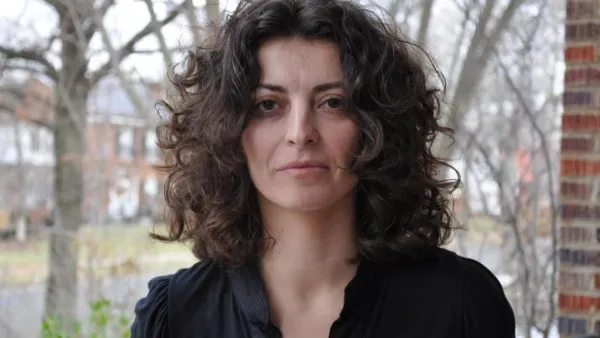Anca Parvulescu's research and teaching interests include global modernism, literary and critical theory, literary comparatism, migration studies, and East Europe.
Anca Parvulescu is the author of four books: Laughter: Notes on a Passion (MIT Press, 2010); The Traffic in Women’s Work: East European Migration and the Making of Europe (University of Chicago Press, 2014); with Manuela Boatcă, Creolizing the Modern: Transylvania across Empires (Cornell University Press, 2022); and Face and Form: Physiognomy in Literary Modernism (Cambridge University Press, 2025).
Parvulescu’s most recent book, Face and Form: Physiognomy in Literary Modernism (Cambridge UP, 2025) argues that modernism was obsessed with the ubiquitousness of the human face. Thomas Mann, Marcel Proust, Virginia Woolf, Gertrude Stein and, later, Kōbō Abe framed their literary projects around the question of the face—its dynamic of legibility and opacity. A proxy for form, memory, intermediality or difference—and combinations thereof—modernism rewrote the face. The old pseudo-science of physiognomy, which posited faces as sites of legible meaning, was in the process reconfigured, but not entirely surpassed. The face in modernist literature lost its connection to interiority, but remained a surface for reading and interpretation. As such, the face also became a canvas for creative appropriations, what Mina Loy called “auto-facial-construction.” Parvulescu is currently co-editing a special issue of Journal of World Literature on the face in global modernism.

Creolizing the Modern: Transylvania across Empires, co-authored with Manuela Boatcă (Freiburg University, Germany), bridges debates in world literature and world-systems analysis to ask how “the world” looks like from the perspective of a small village in Transylvania, historically situated at the crossroads of multiple empires. The book won multiple academic awards: the René Wellek Prize for Best Book in Comparative Literature, offered by the American Comparative Literature Association; the Barrington Moore Award for Best Book in Comparative and Historical Sociology, offered by the American Sociological Association; an Honorable Mention of the Immanuel Wallerstein Award, also offered by the American Sociological Association; and an Honorable Mention of the George Blazyca Prize, offered by the British East European Studies Association. The book was translated into Romanian (ULBS, 2024) and is forthcoming in German translation.
The Traffic in Women's Work: East European Migration and the Making of Europe participates in debates on Europeanization following the EU expansion into East Europe. It argues that the critical project of pluralizing Europe needs to account for the Europe brought together through the circulation of East European women’s labor. Reading recent cinematic texts that critically frame this labor, the book shows East European migrant women, alongside women from the global South, becoming responsible for the biopolitical labor of reproduction, whether they work as domestics, nannies, nurses, sex workers, or wives. Contributions to two handbooks on migration are forthcoming.
Laughter: Notes on a Passion argues for the importance of considering the burst of laughter as an object of analysis, apart from comedy, humor, and jokes. The book has inspired art exhibits in New York and Hamburg and a number of adjacent publications, including translations into French and Turkish. Parvulescu contributed the entry on “Laughter” to the Oxford Research Encyclopedia of Literature. “Even Laughter? From Laughter in the Magic Theater to the Laughter Assembly Line,” appeared in Critical Inquiry, in a special issue on theories of laughter, which also included “Essay on Laughter,” by Norbert Elias, edited by Parvulescu.
Parvulescu has written a cluster of recent articles on literary comparatism: “Istanbul, Capital of Comparative Literature”; “(Dis)Counting Languages: Between Hugo Meltzl and Liviu Rebreanu”; and “The World of World Literature and World-Systems Analysis.” She is currently the PI of a project based at Babeș-Bolyai University (Romania) on the history of comparatism.







